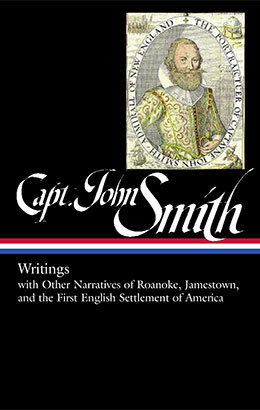James Horn, editor of the Library of America volume Capt. John Smith: Writings, with Other Narratives of Roanoke, Jamestown, and the First English Settlement of America, originally contributed the following piece to the March, 2007 issue of Library of America’s e-newsletter. Horn is Vice President of Research and Abby and George O’Neill Director of the John D. Rockefeller, Jr. Library at the Colonial Williamsburg Foundation, and his books include Adapting to a New World: English Society in the Seventeenth-Century Chesapeake and A Land As God Made It: Jamestown and the Birth of America.
By James Horn
 |
| Capt. John Smith: Writings, with Other Narratives of Roanoke, Jamestown, and the First English Settlement of America |
Captain John Smith has always been a controversial figure. He is perhaps best known for a love affair with Pocahontas (favorite daughter of the paramount chief of the Powhatans, Wahunsonacock) that never happened. Given to speaking his mind and suffering from no lack of confidence in his own abilities, he frequently found himself at odds with his peers and superiors. He thought little of the leaders of Jamestown, and they of him.
Contemporaries had mixed opinions of Smith’s exploits: eulogized by some, ridiculed by others. Doubts were raised early about their veracity, which, one seventeenth-century writer remarked, “seem to most men above belief.” Historians have expressed similar skepticism, pointing to the self-serving tone of many of his writings and inconsistencies in different versions of texts. That Smith was prone to exaggeration and embellishment can hardly be doubted, but recently (especially following publications by the noted scholar Philip L. Barbour) the accuracy of his accounts has been largely confirmed.
Today, John Smith’s writings remain a good read, having an immediacy and vigor that few of his counterparts came close to matching. He was both a superb observer and a superb narrator. His Map of Virginia (1612) gave expression to the sheer expanse of Virginia, the magisterial Chesapeake Bay, broad rivers, innumerable creeks and islands, and diversity of Indian peoples. It was a remarkable achievement, surpassing in detail and significance, if not aesthetic quality, even the wonderful watercolors of Roanoke and its inhabitants painted by John White twenty years before.
In The Proceedings of the English Colonie in Virginia (1612) Smith provided the first authentic account of the early years of the colony and confirmed his role (at least to his own satisfaction) as the central presence in the founding of Virginia. But it was The Generall Historie of Virginia, New-England, and the Summer Isles (1624) that was Smith’s masterwork. Written at a moment when the entire English colonizing effort hung in the balance, the Generall Historie celebrated the promise of America. If England’s colonies, unlike the Spanish Indies, offered no gold or silver, nonetheless they would surely prosper through trade and industry, a more reliable route to wealth. Through hard work, ordinary men and women, the poor and unemployed, would find a measure of comfort in America impossible at home.
Smith was the first chronicler of English America and the first to articulate a vision of the American dream. The writings in this volume cover the first phase of English colonization from the attempted settlement of Roanoke in 1585, through the early years of Jamestown and Bermuda, to the establishment of New England. Smith would not live to see the enormous expansion of commerce and settlement that he predicted but by the time of his death in 1631 he had established himself as a towering figure in the early history of colonization, and by word and deed one of the first founders of English America.



